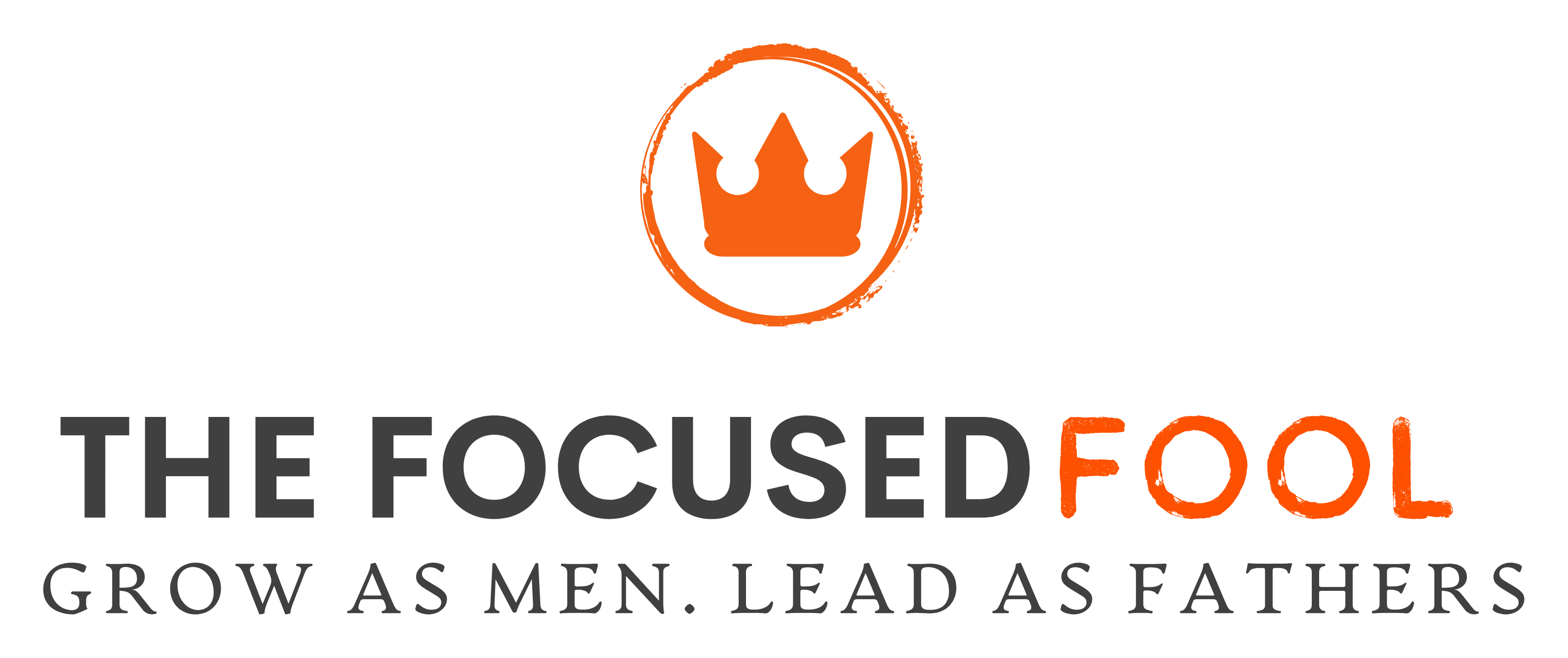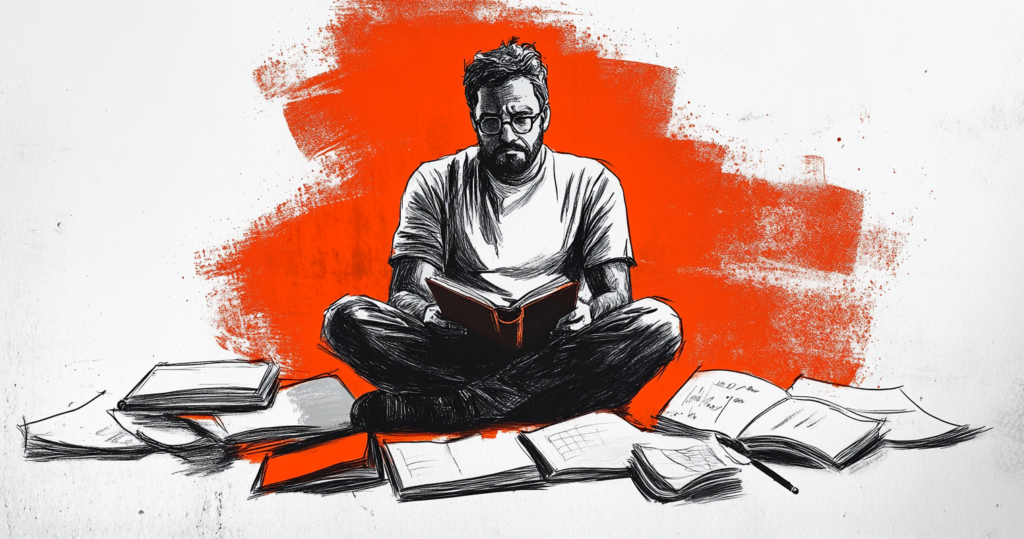A Seeker’s Guide to Fatherhood Wisdom You’ll Actually Apply
There’s no shortage of advice for dads; books, podcasts, reels, and newsletters like this one. I’ve taken in so much I could probably write a book. Or at least a decent inspirational fridge magnet. But the real challenge isn’t learning more. It’s knowing what to keep. And what to let go.
Last week, I caught myself bookmarking yet another article about “7 Ways to Be More Present with Your Kids” while simultaneously scrolling through my phone. The irony wasn’t lost on me, but the pattern sure was familiar. We’re drowning in wisdom but starving for actual change.
So here’s the question that’s been rattling around my head: How do I know what advice is worth remembering and what’s just noise for someone else’s life?
The Dad Advice Avalanche
When Learning Feels Like Drowning
If you’re anything like me, your “saved for later” folder is bursting with life-changing insights you’ve never actually tried. Your podcast queue is longer than your to-do list, and you’ve got more parenting principles than you have hours in the day to practice them.
The problem isn’t that the advice is bad. Most of it’s genuinely helpful. The problem is that knowing something and growing from it are two completely different things. I can tell you seventeen different strategies for handling toddler tantrums, but if I’m still losing my cool when my six-year-old melts down over the wrong color cup, what good is all that knowledge doing me?
We’ve become advice collectors instead of wisdom practitioners. And somewhere in the endless scroll of “dad hacks” and “parenting wins,” we’ve lost the ability to discern what actually applies to our lives right now.
Find Your Personal Bullseye
Before You Filter Advice, Know What You’re Aiming For
Here’s where most of us get it backwards. We collect advice first, then try to figure out how to use it. It’s like buying random tools at a garage sale and then wondering why your garage is full of stuff you never use.
The secret isn’t better advice, it’s better aim. Before you consume another podcast episode or highlight another sentence in that parenting book, you need to know what you’re actually trying to hit.
So let’s get specific. Right now, before you read another word, ask yourself these three questions:
What’s my current friction point as a dad/husband/man? Not the generic struggles everyone talks about. Your specific pain point. Is it the morning routine chaos? The way you shut down when your partner tries to talk about hard stuff? The fact that you feel like you’re just surviving instead of actually enjoying your kids?
What kind of father do I actually want to become in the next 6–12 months? Not the Instagram-perfect dad version. The real, achievable-if-I-actually-try version. More patient? More present? Better at playing? More consistent with boundaries?
What do I need more of—patience, presence, consistency, play, confidence, or something else entirely? Pick one. Yes, you probably need all of them. But if you had to choose the one that would make the biggest difference in your family right now, what would it be?
Until you name that target, every piece of advice feels urgent. Once you do? You can spot the gold and let the rest pass by without guilt.
The Relevance Radar
How to Know If It’s Meant for You
Now that you have a target, you need a filter. Because even good advice can be terrible advice if it’s not meant for your season, your situation, or your actual problems.
Here’s my four-question gut check that I run every piece of advice through:
1. Is this advice aimed at my current season of life? Newborn dad advice hits different when you’re wrangling teenagers. Sleep training tips don’t help when your biggest challenge is screen time battles with your ten-year-old. Don’t try to apply advice that’s solving tomorrow’s problems while today’s are still kicking your butt.
2. Is this solving a real problem I’m wrestling with now? Not a problem you think you should have, or one that sounds impressive to worry about. A real, this-is-actually-making-my-life-harder problem. If it’s not addressing something you’re genuinely struggling with, it’s mental clutter.
3. Does this align with my core values or feel performative? Some advice sounds great in theory but feels fake when you try to live it. If it doesn’t match who you actually are and want to become, it’s not going to stick anyway. Don’t try to become someone else’s version of a good dad.
4. Could I try this this week without adding stress or guilt? If implementing the advice requires a complete life overhaul, three new apps, and a personality transplant, it’s probably not the right advice for right now. The best advice is simple enough to test drive immediately.
If it fails this gut check, even if it came from a bestselling author or that dad blogger everyone raves about, it’s just noise. Let it go.
The One-Takeaway Rule
The Power of Choosing Just One
Here’s where we need to talk about your inner overachiever. I see you over there, ready to implement fifteen new dad strategies by next Tuesday. Slow down, tiger.
You don’t need 100 tips. You need one habit shift that compounds over time. One insight that you actually practice until it becomes natural. One small change that makes everything else a little bit easier.
This is harder than it sounds because we’ve been conditioned to believe that more equals better. More strategies, more systems, more optimization. But here’s what I’ve learned the hard way: one thing done consistently beats ten things tried sporadically.
So when you find that piece of advice that passes your relevance radar, don’t add it to your mental collection. Choose it. Write it down. And practice it for seven days straight.
Yes, just one. You are not a self-help octopus. You don’t need eight different approaches running simultaneously. You need one thing that you can actually do when your kid is melting down, when you’re exhausted, when life is happening at full speed.
Make It Sticky
From Insight to Implementation
Knowing what to do and actually doing it are separated by what I call “the implementation gap“—that space between good intentions and real change. Most advice dies in that gap.
The trick is making your chosen advice impossible to ignore. Use cue-based routines: “When I hear myself about to interrupt my kid, I pause and ask a question instead.” Put up Post-it notes where you’ll see them. Set phone alarms with reminders. Tell your partner what you’re working on so they can gently call you out when you forget.
Or better yet, teach it out loud. Explain to your kids what you’re trying to get better at. “Dad’s working on listening better before I give advice. If you notice me jumping in too quick, just say ‘Dad, listening mode,’ okay?” They’ll keep you honest, and you’ll model that growth is a lifelong process.
Here’s a real example from my life: I kept catching myself scrolling my phone when my kids were trying to talk to me. So I made a simple rule—phone goes face down on the counter when I walk in the door. Not perfect. Sometimes I forget. But it works way more often than my previous strategy of “trying to be more mindful,” which was basically no strategy at all.
The key is making the new behavior easier than the old one, at least in the moment when it matters.
Perfection Is the Enemy of Practice
You Don’t Need to Nail It—Just Try It
Let’s be real about something: you’re going to mess this up. You’ll choose a piece of advice, commit to practicing it, and then completely forget about it when your toddler throws a sandwich at the dog while your baby is crying and you’re trying to answer a work email.
That’s not failure. That’s just Tuesday.
The real growth loop isn’t “learn something, apply it perfectly, move on to the next thing.” It’s “try, fail, reflect, adjust, try again.” Rinse and repeat until it sticks. You’re not broken if it doesn’t work right away. You’re human.
I’ve been working on the same patience-building strategies for literally years. Some days I nail it. Some days I lose my cool over something completely ridiculous (like my kid putting their shoes on the wrong feet for the third time in a row). But the trajectory is upward, even if the daily reality is messy.
Small wins matter more than perfectly executed systems. Progress matters more than performance. And showing up consistently, even imperfectly, matters more than waiting until you can do it right.
The Next Time You Feel Overwhelmed
The next time you feel overwhelmed by another great podcast or book recommendation, stop. Take a breath. Ask yourself: “Is this for me? Right now?”
If the answer is no, let it go. Bookmark it if you want, but don’t feel guilty about not diving in immediately. It’ll be there when you need it.
If the answer is yes—write it down, choose one specific thing to try, and live it out loud for a week. See what happens. See what sticks. See what actually makes a difference in your real, messy, beautiful life as a dad.
Because here’s the thing: you already know more than you think you do. You don’t need more information. You need more implementation. You don’t need more advice. You need more practice.
And you definitely don’t need to figure it all out at once. You just need to figure out the next right thing to try.
The Focused Fool Newsletter – Growing As Men. Leading As Fathers.
Focused Wonder: What’s one piece of advice you’ve heard this month that actually resonates with where you are right now? What’s one way you could test it this week?


Leave a Reply